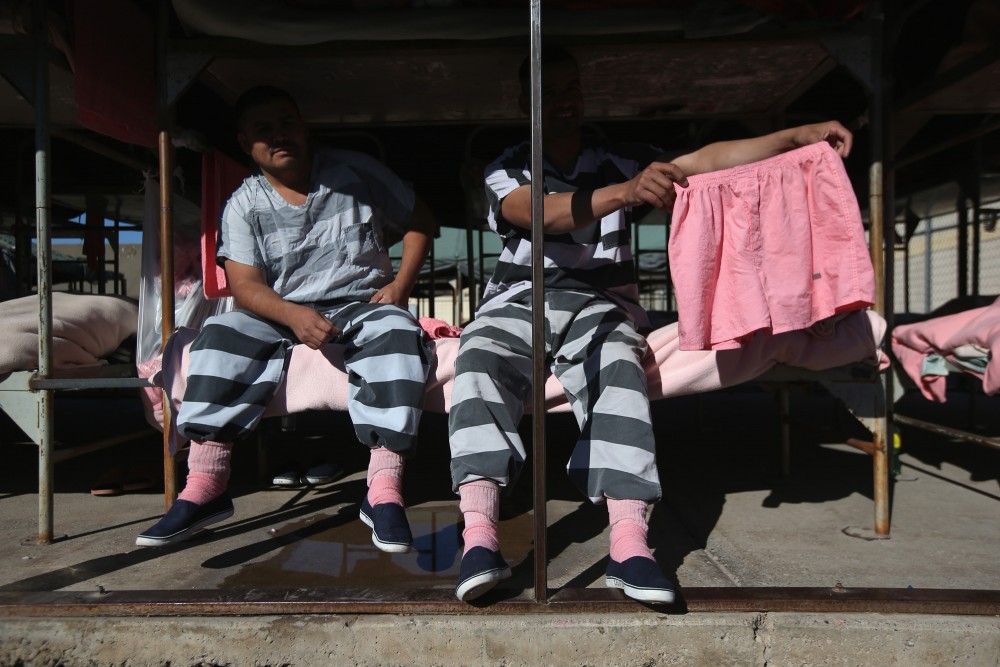Abril Gallardo first became involved with grassroots organizing as a young undocumented student living in Arizona in 2010. She joined Living United for Change in Arizona, or LUCHA, shortly after the state legislature passed the draconian “show me your papers” immigration law and started holding her own know your rights meetings around her community and knocking on doors to get rid of Maricopa County Sheriff Joe Arpaio.
Senate Bill 1070, as its officially known, was the most punitive immigration law in the nation and gave rise to copycat legislation in other states. The bill, which was signed into law by former Republican Gov. Jan Brewer, encouraged racial profiling by allowing police officers to question anyone deemed suspicious about their immigration status during any interaction, including routine traffic stops. State Senate President Russell Pearce, a powerful far-right lawmaker and architect of SB 1070, made his hostility toward immigrants his signature legislative issue — paving the way for Arpaio to use his department to make life so miserable for immigrants that they would rather flee the state.
Under his 24-year reign, which spanned from 1993 to 2016, Arpaio and his officers systematically targeted Latinos and people of color, used brutal policing policies, and were accused of far too many forms of misconduct to list. “We had our own Trumpistas, or little Trumps, before Trump,” Gallardo said.
“We experienced raids in our neighborhoods before raids were streamlined throughout the nation,” she continued. “Our people, Black and brown bodies, were being killed by police departments. That has been happening for many, many years. We saw our car washes getting raided, and workers, literally moms and dads, not being able to pick up their kids because they were arrested by Arpaio. We were able to experience all of that way before Trump was elected.”
Gallardo is now a communications director of LUCHA, but back then she just wanted to learn her rights and know how to protect her family, in case they were ever pulled over on their way to church or the grocery store. “It was a very scary time,” she said. Whenever they missed a call on the home phone, she recalled, “My first thought would be, ‘Oh my God, my dad got pulled over.’”
Gallardo was far from the only one who decided to stay in the state and transform the fear into energy. Arpaio, who became nationally known for workplace raids and neighborhood sweeps aimed at rounding up undocumented immigrants, seemed invincible. Pearce did too. But their yearslong crusade against immigrants had an unintended consequence: It ended up galvanizing an entire generation of Latinos and young progressives, who helped build a grassroots movement that would eventually push them out of office and transform the state’s politics.
If Arizona turns blue on Tuesday, it will be the result of relentless on-the-ground organizing and a yearslong effort to register voters by activists who have played a crucial role in some of the left’s biggest political victories in the state. Unlike the Trump campaign, the Biden team avoided in-person canvassing for most of the year out of fear of spreading the coronavirus. But halting door-to-door efforts put the Democratic nominee at a disadvantage, and grassroots groups and activists have been filling in the void. While the pandemic has made in-person outreach harder, it has also been a motivating force, as Arizona’s Latino communities are among the hardest hit by Covid-19.
Rep. Raúl Grijalva, a progressive Democrat who has represented southern Arizona in Congress since 2003, believes that Democrats are poised to sweep the elections in his home state. “Fourteen years ago, a decade ago, nobody would have imagined that,” he told The Intercept in a phone interview, after spending most of the day campaigning with Democratic vice presidential candidate Kamala Harris in Tucson.
“[SB 1070] was a watershed moment for the state of Arizona, in the sense that it was so raw and so politically motivated in terms of making the immigrant community and Latinos, by obvious association, the target that it backfired,” Grijalva said. “And it backfired in the sense that it politicized a lot of people and energized a generation of activists.”
Grijalva, who contracted Covid-19 in early August, added that the “abject failure” and “incompetence” of the Trump administration’s pandemic response, along with the disproportionate infection rates among Latinos in the state, have been the major factors driving voters away from Trump.
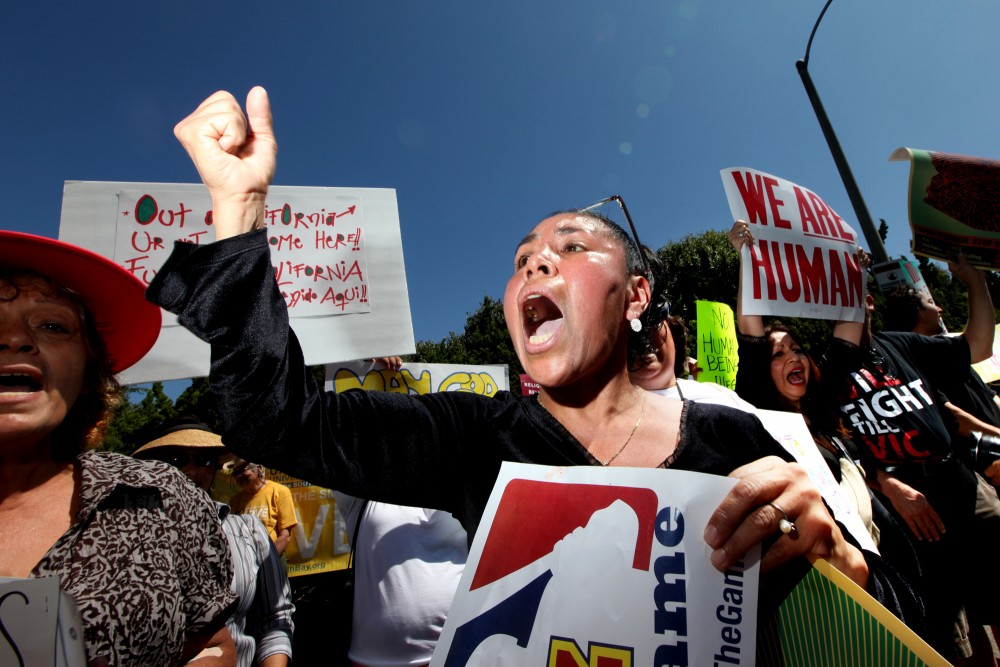
Left/Top: Immigrant inmates show off a pair of pink underwear while sitting on a bunk in the Maricopa County Tent City jail in Phoenix, on March 11, 2013. Right/Bottom: Protesters chant during a protest against Maricopa County Sheriff Joe Arpaio during his visit in Rancho Bernardo, Calif., on Aug. 10, 2010. Photo: John Moore/Getty Images; Sandy Huffaker/Getty Images
The movement didn’t come together immediately. After the passage of SB 1070, a law Grijalva considered “harsh” and “discriminatory,” he suggested a limited boycott of the state to pressure lawmakers to reconsider the policy, comparing it to the boycott of Arizona in the 1990s when the state refused to recognize Martin Luther King Jr. Day. As a result, the congressman received a wave of death threats, and the windows on his Yuma district office were shot out. He ended his call for a boycott when a federal judge halted key parts of SB 1070, but his reaction to the law made his 2010 reelection race, which should have been in the bag, the toughest of his entire career.
“Well, it became a thing that the whole political establishment, including many Democrats, unified around the idea that I was calling for economic sanctions against the state,” he said. “And over a million bucks — in those days that was a lot of money — from independent expenditure campaigns were against me.”
He defeated his Republican challenger by less than 10,000 votes.
Bazta Arpaio, organizers said, led the largest get-out-the-vote canvassing effort in Arizona history, specifically mobilizing first-time Latino voters.
The Supreme Court struck down portions of SB 1070 in 2012, but it didn’t lose most of its power until 2016, as part of a settlement with the National Immigration Law Center and other immigrants’ rights groups that sued after its passage.
LUCHA (which means “struggle” or “fight” in Spanish) was formed in 2009 in response to SB 1070, but grew its political clout through the Arpaio fight. In 2016, the leaders of LUCHA, Puente, and Poder in Action, created the Bazta Arpaio campaign, joining forces with labor movement leaders, like AFL-CIO organizer Neidi Dominguez and AFGE organizer Joe Diggs. Bazta Arpaio, organizers said, led the largest get-out-the-vote canvassing effort in Arizona history, specifically mobilizing first-time Latino voters.
On November 9, 2016, the same day Donald Trump was elected, thousands of activists and volunteers celebrated the defeat of Arpaio in what local organizers described as a “bittersweet moment.”
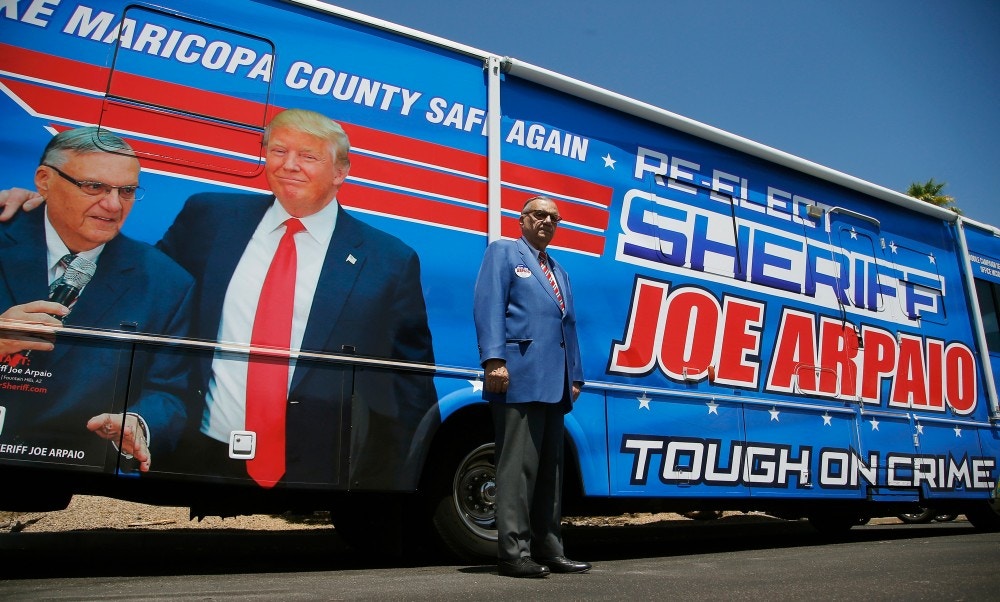
Photo: Ross D. Franklin/AP
Arpaio, whom Trump pardoned in 2017, tried to get his old job back earlier this year but lost the Republican primary to his former Chief Deputy Jerry Sheridan by about 6,000 votes, marking his third electoral defeat in four years. He also had an unsuccessful run for a U.S. Senate seat in 2018.
LUCHA has knocked on hundreds of thousands of doors in neighborhoods in South Phoenix, South Tucson, and West Phoenix since then. One Arizona, which is made up of 23 organizations, collectively registered 190,000 voters in 2018 and took on a similar goal this year. Many of these groups have been increasing their outreach efforts each year, creating a voter mobilization machine. With more than 1.63 million ballots cast two days before the election, voter turnout in Maricopa County has already surpassed 2016 levels, according to election officials.
Groups like Mijente, Chispa AZ, and Mi Familia Vota, which were part of the coalition One Arizona, have also been crucial in building to the current moment. Mijente was also a product of the SB 1070 fight and Arpaio era.
“You see just a tremendous force of young people that you’ve seen throughout this decade really leading the fight here in Arizona.”
“The kids of the parents who Joe Arpaio and Russell Pearce terrorized through SB 1070 are the same kids that are voting for the first time,” Gallardo said. “And you better know that they remember what their parents went through. They’re voting out Trump, they’re going door-to-door getting other people out to vote, and you see just a tremendous force of young people that you’ve seen throughout this decade really leading the fight here in Arizona.”
Some of the Latino activists who were actively involved in the fight against these anti-immigrant policies — like Phoenix City Council member Carlos Garcia and Democratic state Rep. Raquel Terán — sensed their power and decided to run for elected office. Garcia, a Mexican American immigrant and founder of the immigrant rights group Puente Arizona, protested Arpaio and has been arrested several times protesting deportations — a background not typically seen in Arizona’s local elected officials. Terán, who was active in the successful recall effort against Pearce, won a seat in the state legislature in 2018.
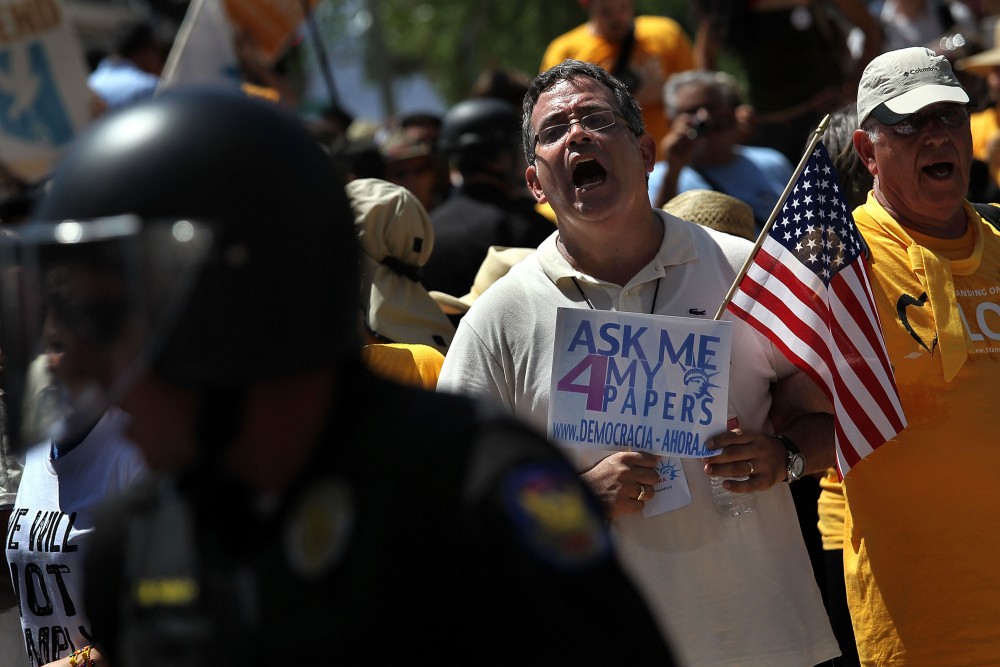
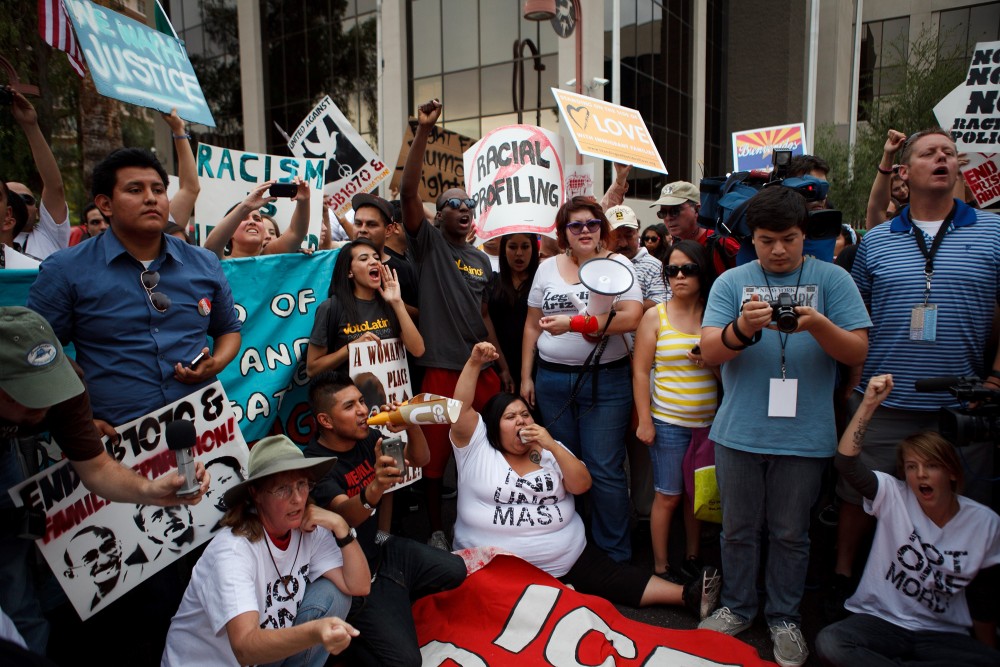
Left/Top: A protester shouts at a riot police officer before being arrested at a demonstration against Arizona’s immigration enforcement law SB 1070 on July 29, 2010 in Phoenix. Right/Bottom: Protesters opposed to Arizona’s Immigration Law SB 1070 rally for immigrant rights in Phoenix, on April 25, 2012. Photo: John Moore/Getty Images; Jonathan Gibby/Getty Images
The wave of Latino activism that emerged in response to Arpaio and the state’s racist policies, combined with long-lasting demographic changes, has accelerated Arizona’s political transformation from a Republican bastion to an increasingly purple state. Alicia Contreras, executive director of CORAZÓN Arizona, a faith-based community group, said that the state’s political shift is a result of “our blood, sweat, and tears, out there on the field, registering voters and educating folks.”
In 2020 alone, LUCHA has made nearly 3 million calls to get out the vote. LUCHA’s sister organization, the Arizona Center for Empowerment, has been focusing on a civic engagement campaign that recently registered 47,000 new voters. Unite Here, the union representing hospitality workers, has been knocking on doors in the desert heat, which the Biden campaign and party avoided doing for most of the season. Biden’s team is aiming to win at least 70 percent of Latino voters in the state.
No Republican has ever won the presidency without Arizona.
With 11 electoral votes and a U.S. Senate seat on the line, Arizona has become one of the most hotly contested battleground states in the country. It’s a must-win for Trump, who captured the state by a margin of 3.5 percentage points in 2016. No Republican has ever won the presidency without Arizona. It’s possible, but it hasn’t been done and the path would be very narrow. The most recent polling averages suggest that Biden is ahead by about 2.8 points. Though Biden has not traveled to the state as much as Trump has, the state has attracted tens of millions of dollars from both sides, making Phoenix one of the biggest advertising markets in the presidential race.
CORAZÓN Arizona has been holding socially distanced canvassing sessions, phone-banking events, and text banking leading up to the election. “Yes, there’s a candidate that is more aligned and willing to support our values,” she said. “But we understand that we still have to do work. It does not stop on November 3.”
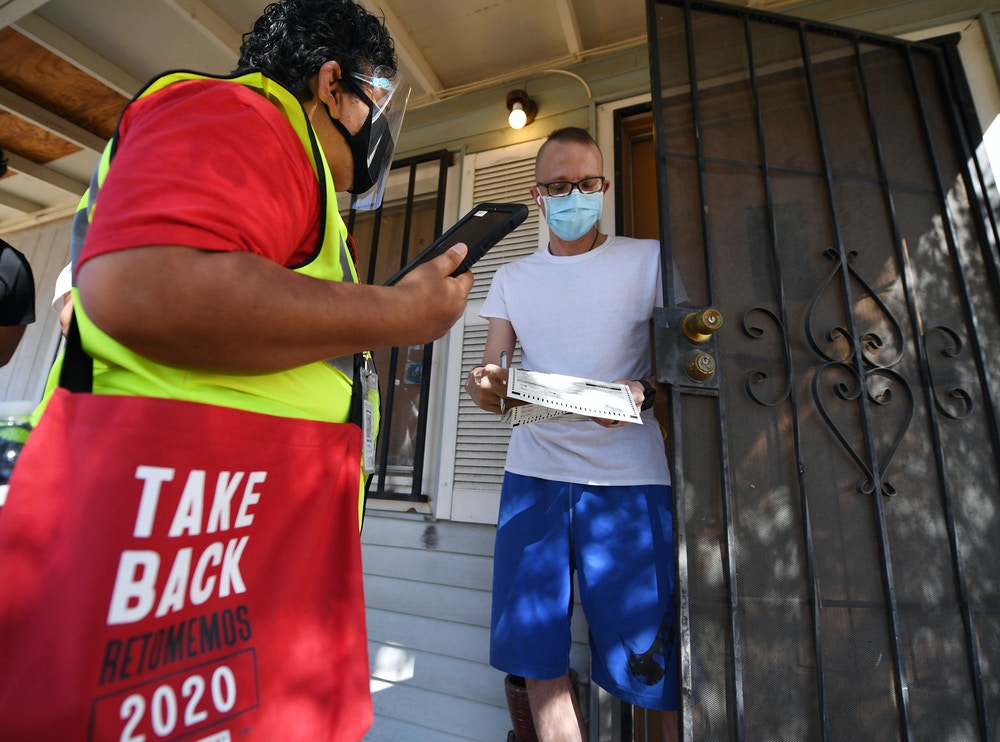
Photo: Robyn Beck/AFP/Getty Images
The race between moderate Democrat Mark Kelly, a former Navy captain and astronaut, and Republican Sen. Martha McSally, could potentially decide the balance of power in the Senate. In recent weeks, Kelly has opened an even bigger lead over McSally and dramatically outraised the incumbent, raising more than $83 million, compared with her $50 million. McSally was appointed to the seat previously held by the late Sen. John McCain in 2018, after losing a race for the other Senate seat to Democrat Kyrsten Sinema. Democrats also have good chances of taking the state House and breaking up the Republican trifecta. They only need to win two House seats. While it’s much less likely that Democrats flip both the state House and Senate, their chances of recapturing the legislature are better than they have ever been.
While it’s much less likely that Democrats flip both the state House and Senate, their chances of recapturing the legislature are better than they have ever been.
In Arizona, Latinos make up about a quarter of the state’s electorate, and increased turnout among the demographic contributed to Sinema’s 2.3 margin of victory in 2018. More than 103,000 Latinos in Arizona reached voting age between 2018 and 2020 alone, according to a Mi Familia Vota report. Nationally, Latino voters are projected to be the largest nonwhite voting bloc for the first time in history.
Though Biden has consistently held a significant lead over Trump among Latino voters, Trump’s reelection campaign has been aggressively courting Latino male voters in states like Arizona and Florida, and appears to be siphoning a bit of Biden’s support. A recent poll from the New York Times found that the former vice president leads among Latina voters by 34 percentage points, but only 8 points among men.
“I’ve been thinking a lot about that lately,” Grijalva said about the gender gap. “Just like with white males, and particularly with second- and third-generation Chicanos,” he believes, these voters have drifted toward Trump because “that’s the only way they can express their sense of losing dominance, and it’s unfortunate.”
Biden’s struggle to appeal to Latino voters stretch back to the Democratic primary, when he lost young Latino voters overwhelmingly to Sen. Bernie Sanders across several Western states. He’s caught up since then, but still lags behind Hillary Clinton’s 2016 level of support in some states. Even after clinching the nomination, the Biden campaign was slow to prioritize Latino voter outreach.
Aida Chavez | Radio Free (2020-11-02T18:59:54+00:00) If Arizona Goes Blue, Look to Joe Arpaio — and the Latinos Who Organized Against Him. Retrieved from https://www.radiofree.org/2020/11/02/if-arizona-goes-blue-look-to-joe-arpaio-and-the-latinos-who-organized-against-him/
Please log in to upload a file.
There are no updates yet.
Click the Upload button above to add an update.
